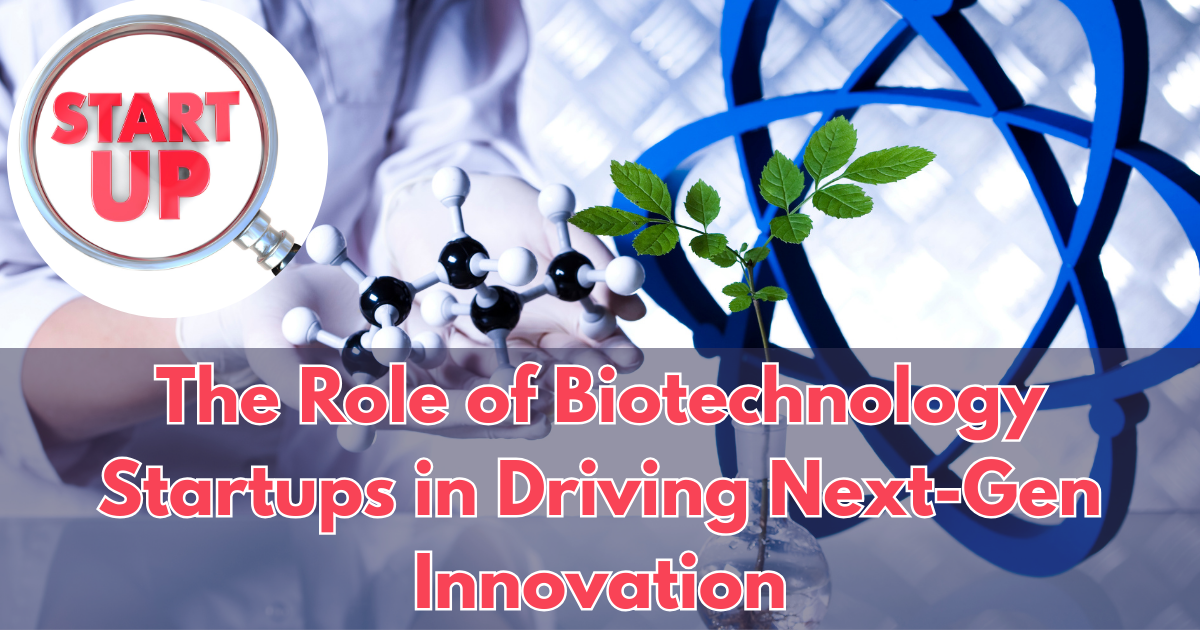The Role of Biotechnology Startups in Driving Next-Gen Innovation: The essay explores the transformative power of biotechnology-driven entrepreneurship, highlighting its potential to address global challenges and drive sustainable growth. By leveraging biotech innovations, entrepreneurs can develop novel solutions to pressing problems in healthcare and environmental sustainability.
The Role of Biotechnology Startups in Driving Next-Gen Innovation
Innovation is the lifeblood of biotech startups, driving advancements that can revolutionize healthcare, agriculture, environmental sustainability, and numerous other fields. Biotech startups, by their very nature, thrive on the ability to develop groundbreaking technologies and novel solutions to some of the world’s most pressing challenges.

The Importance of Innovation in Biotech
- Driving Medical Breakthroughs
Innovation in biotech has led to significant medical breakthroughs, transforming how diseases are diagnosed, treated, and prevented.
- Personalized Medicine: Tailoring treatments to individual genetic profiles has improved the efficacy and safety of therapies, particularly in oncology and rare diseases.
- Gene Editing: Technologies like CRISPR-Cas9 have opened up new possibilities for treating genetic disorders by enabling precise modifications to DNA.
- Biopharmaceuticals: The development of biologics and biosimilars has provided new treatment options for chronic diseases such as rheumatoid arthritis and diabetes.
Enhancing agricultural productivity
- Genetically Modified Organisms (GMOs): GMOs have been engineered to withstand harsh environmental conditions and pests, leading to higher crop productivity.
- Biopesticides and Biofertilizers: These sustainable alternatives to chemical pesticides and fertilizers reduce environmental impact and promote soil health.
Promoting Environmental Sustainability
This is another area where biotech startups make significant contributions.
- Bioremediation: Using microorganisms to break down pollutants in the environment helps clean up contaminated sites in the environment.
- Biofuels: Developing sustainable biofuels from biomass reduces reliance on fossil fuels and decreases greenhouse gas emissions.
- Waste-to-Energy Technologies: Converting waste materials into energy sources through biological processes offers a sustainable solution for waste management.
Overcoming Challenges to Innovation
- Funding and Financial Constraints
This is diverse funding sources: Exploring various funding options, such as grants, venture capital, and strategic partnerships, can provide the necessary financial support.
Efficient Resource Management:
Allocating resources efficiently and prioritizing key projects can help maximize the impact of available funding.
- Talent Acquisition and Retention
Attracting and retaining top talent is crucial for driving innovation, as the biotech industry relies.
Competitive Compensation: Offering competitive salaries and benefits can help attract and retain top talent.
Professional Development: Providing opportunities for professional growth and development can enhance job satisfaction and loyalty.
- Intellectual Property Protection
Patent Strategy: Developing a robust patent strategy to protect innovations and prevent competitors from copying them.
IP Management: Regularly reviewing and managing the IP portfolio to ensure ongoing protection and compliance.
The Future of Innovation in Biotech
Emerging Trends
- Precision Medicine: These advances in genomics and personalized healthcare will continue to drive the development of targeted therapies and diagnostics.
- Synthetic Biology: The ability to design and construct new biological systems will lead to novel solutions in healthcare, agriculture, and environmental sustainability.
- Digital Health: This is integrating digital technologies with biotech, such as wearable devices and telemedicine, which will transform healthcare delivery and patient monitoring.
Collaboration and Open Innovation
Collaboration and open innovation will play an important role in advancing biotech innovation. By partnering with academic institutions, research organizations, and other industry players, biotech startups can leverage collective expertise and resources to accelerate progress.
- Public-Private Partnerships: Collaborating with government agencies and non-profit organizations can provide funding and support for innovative projects.
- Industry Consortia: Joining industry consortia and alliances can facilitate knowledge sharing and collaborative research efforts.
Top 10 Trends in Biotechnology in 2025
- Artificial Intelligence
- Big data
- Gene Editing
- Precision Medicine
- Gene Sequencing
- Biomanufacturing
- Synthetic Biology
- Bioprinting
- Microfluidics
- Tissue Engineering
This data-driven research provides innovation intelligence for this in-depth research that helps you improve strategic decision-making by giving you an overview of emerging technologies in the biotech industry. And the most important gene sequencing and gene editing technologies allow companies to understand genomes and engineer them for commercial purposes.
Conclusion
In this article we discussed The Role of Biotechnology Startups in Driving Next-Gen Innovation: The essay explores the transformative power of biotechnology-driven entrepreneurship and the providing of opportunities for professional growth and development that can enhance job satisfaction and loyalty. The future of innovation in biotech is that collaboration and open innovation will play an important role in advancing biotech innovation.
